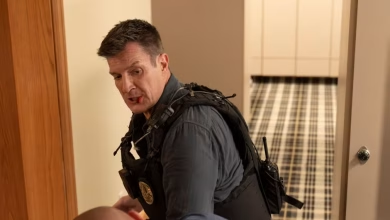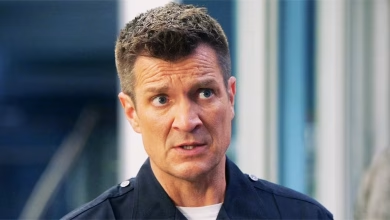Why Did Bishop Leave ‘The Rookie’?
The issues taking place on set of ‘The Rookie’ were a lot more complicated than you think.
When Afton Williamson’s Talia Bishop, a central character with a bright future in police procedural drama The Rookie, departed the show after the first season, it sent shock waves through the show’s fan base. Even less convincing was the story plot twist the show adopted to highlight why she failed to return for the second season — that she had left the Los Angeles Police Department (LAPD) to take up a role as a special agent with the Bureau of Alcohol, Tobacco, Firearms, and Explosives (ATF).
For a character that had been introduced on the show with a clear goal and lofty ambitions of climbing the ladder of the LAPD’s Mid-Wilshire Division from the training officer position that she held, to becoming a detective and even chief of police, writing her off the script with the plot twist that she had left for ATF was shocking to many fans. While this happens both in real life and in the fictional world, there would have to be a compelling reason for the on-screen disappearance of a character like Bishop on The Rookie.
Why Did Afton Williamson Leave ‘The Rookie’?

As it unfolded on the set of ABC’s procedural drama, The Rookie, Afton Williamson, who played Bishop, revealed in an Instagram post that she had experienced “racial discrimination”, “bullying”, and “sexual harassment”. Without naming who the perpetrators were, she pointed a finger at a “recurring guest star” for sexual harassment, and the crew’s hair department for racist commentary and bullying that she says escalated into sexual assault at the show’s wrap party. Williamson added that she had reported the matter to the showrunner who she said had not passed on the complaint to HR as per protocol. Williamson later identified the people she said had committed the misconduct against her.
Following Williamson’s post, ABC released a statement confirming that they were aware of the allegations that involved a production (The Rookie) whose lead studio is Entertainment One. While Entertainment One was conducting investigations into the matter, ABC had commissioned a third party to conduct independent investigations too. The investigations concluded that there was no wrongdoing in Williamson’s misconduct allegations and that the executive producers, including showrunner, Alexi Hawley had taken the necessary steps to address the matter. However, Williamson disagreed with the findings.
How Talia Bishop’s Exit Impacted ‘The Rookie’

Williamson’s character, LAPD Officer Talia Bishop, had been a significant part of the first season, serving as a training officer for John Nolan, portrayed by Nathan Fillion, who had become the oldest rookie in the Los Angeles Police Department. Talia Bishop was a character with a remarkable backstory. Growing up in the foster care system, she had overcome a turbulent childhood, driven by a determination to build a successful career.
Her role as Nolan’s training officer was central to the show’s dynamics and their interactions. Although they were often filled with clashes, it was essential in Nolan’s growth as a rookie cop. Bishop saw potential in Nolan that others often overlooked, encouraging him to embrace his age as a strength rather than a liability. Her exit had a significant impact on Nolan’s storyline as the creators had to find new ways to develop his character without her.
Which Characters Exited ‘The Rookie’?

Before Afton Williamson’s character Talia Bishop departed the show, another central character on the show had unexpectedly been killed off in Season 1. Captain Zoe Andersen (Mercedes Mason), who was another great ally of Nolan, was killed in “Greenlight” (Season 1, Episode 16) following a fatal wound from a shootout with a criminal gang. While it isn’t uncommon for dramas to kill off characters, Andersen’s departure was unexpected early on in the series. She had been the one that had requested for Nolan personally at the division and her partnership with him was a fan favorite.
While responding to heartbroken fans on his Twitter (now X) handle, showrunner Alex Hawley said that it was not always the plan to kill Andersen’s character, adding that it was a creative choice they discussed over and over in the writers’ room before coming up with the decision. Although Mercedes Mason would later return to make a cameo in the show in Season 3 in a flashback. The subsequent departure of Afton Williamson’s character robbed Nolan of two of his closest allies on the show.
How Afton Williamson’s Exit From ‘The Rookie’ Influenced Others

As the dust settled on Williamson’s departure, The Rookie faced yet another exit in Season 4. Officer Jackson West, portrayed by Titus Makin Jr., met a mysterious end in the season premiere, shot in the back. Just like the sudden plot twist in Bishop’s storyline, this felt strange. Jackson, played by a stand-in with only the back showing, refused to enter a truck while kidnapped alongside Detective Lopez (Alyssa Diaz) and was shot in the back by a La Fiera gang member. Showrunner Alexi Hawley revealed that Makin Jr. had decided not to return to the show, leading to the character’s unexpected exit. While the exact reasons for Makin Jr.’s departure remain unknown, it added another layer of intrigue to the show’s evolving cast dynamics. There had been reports that Makin Jr. had long wanted out of the show after the police killings of George Floyd and Breonna Taylor, and almost didn’t turn up for Season 3 but decided to return after a conversation with the showrunner. Season 3 had Makin Jr.’s police rookie character, Jackson West, paired alongside a racist training officer who tormented Jackson in his last experience as a rookie before being promoted to police officer II. Jackson got justice as the racist police training officer, Doug Santon (Brandon Routh), got sacked. Makin Jr. has not commented on his exit from The Rookie.
In the wake of these cast departures, The Rookie continues to navigate the challenges of maintaining a cohesive storyline while saying goodbye to beloved characters. The independent investigations’ conclusion that there was no misconduct as Williamson had stated aided the show to go on. The off-screen drama and real-life issues faced by the cast members have undoubtedly cast a shadow over the show’s praise for a diverse cast and positive portrayal of women in law enforcement. With its otherwise engaging narrative, these issues leave fans with a lot to reflect on the complexities of the entertainment industry.




